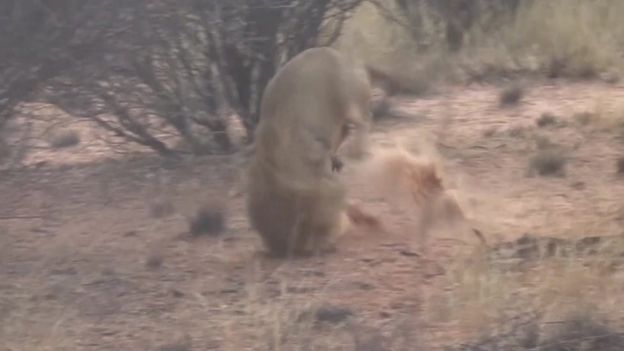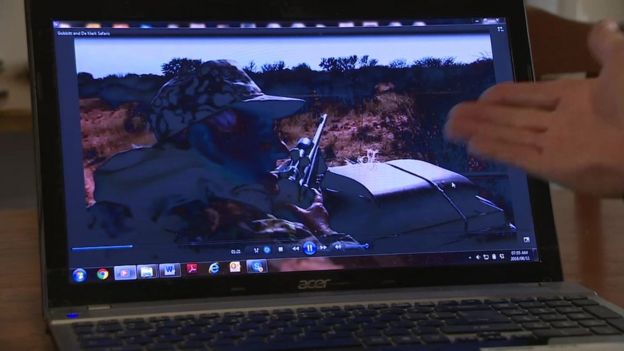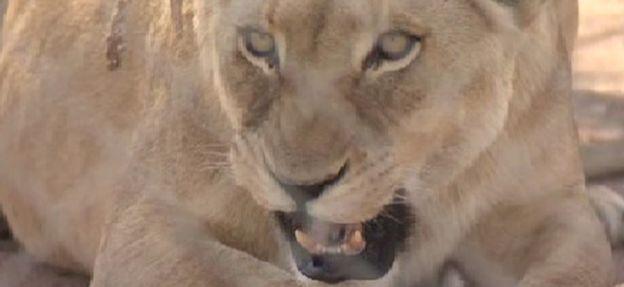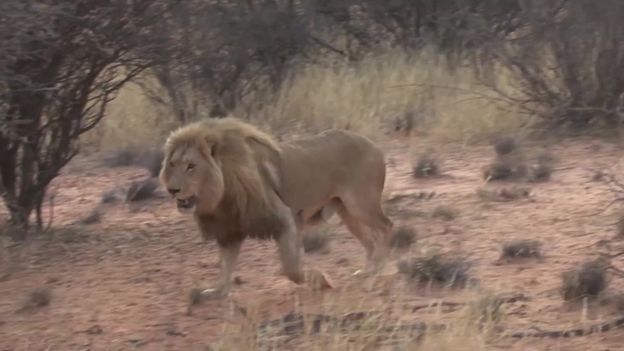
The guide whistles as the large, dark-maned lion walks just a few metres from the car.
It looks around to face the American hunter and a single shot rings out in the South African bush.The lion cartwheels from the force of the bullet - shocked and confused it roars, turns and quickly limps off into the bush.
"Shoot him again, shoot him again, shoot him again," the professional hunter frantically urges, as the hunter reloads, firing into the trees.
The video cuts to see the lion lying dead and the American walking up to him.
"Hey you," he says, "I'm sorry, but I wanted you," before leaning down and kissing the lion.
Why big game hunting is big business in South Africa
The video was shot by Derek Gobbett, a safari cameraman brought in to make a souvenir for the 10 American hunters who had paid thousands of dollars each to shoot a lion.
But he says the way they went about was neither fair nor legal - that it was something known as "canned lion" hunting - more of a duck shoot than a lion hunt.
Hunting is big business for South Africa - it was worth $70m (£50m) in 2013 - but this is generally understood to be for wild animals, not those bred in captivity just to be shot.
'It's all just a lie'
Every year hundreds of lions are bred in captivity across South Africa for the purpose of being placed onto private game reserves for hunting."Eight lionesses were released [from captivity] literally the day before the clients arrived - in fact four were released as the plane was landing just down the road," Mr Gobbett told the BBC.
"We shot that first lion probably within half-an-hour," he said.
A new report by the International Fund for Animal Welfare (IFAW) says in the decade between 2004 and 2014, 1.7 million animals were killed for their "trophy".
At least 200,000 of them were threatened species such as elephants, rhinos or lions.
IFAW found that the US was the biggest importer of stuffed animal heads, while South Africa was the biggest exporter - and lions were by far the most traded.
"Right from the start, the guys are told it's very dangerous - that these are wild animals… and of course they take it all in," Mr Gobbett said.
"It's all: 'You got so lucky, that was such an amazing shot.' Slaps on the back: 'You're such a hero, look at what you've done - you have got your king of the jungle.'
"Meanwhile, it's all just a lie."
Arguments in support
The IFAW report says there are between 6,000 to 8,000 lions kept in captivity in South Africa, in up to 200 ranches."Canned" lion hunting is illegal in South Africa, but captive-bred lion hunting is allowed. Amid a raft of regulations there is a fine line between the two - and something which differs by province.
"All the lion hunting in South Africa is supposed to be with permits, and those are regulated hunts that have to be done to a certain criteria," said Carla van der Vyver, chief executive of the South African Predator Association (SAPA).
"If such an activity has happened and it was not done to permit regulations it is definitely not a thing that SAPA will support," she said in reference to the video footage.
SAPA does support captive-bred hunting, unlike the Professional Hunters Association of South Africa, which voted to ban the practice last year.
Trophy hunting in numbers
- Up to 1.7 million hunting trophies have been traded between nations between 2004 and 2014
- At least 11,000 lion trophies have been traded worldwide in 2004-13
- US was the biggest importer of stuffed animal heads, while South Africa was the biggest exporter
- About 200 lion breeding facilities in South Africa house between 6,000 and 8,000 lions
- Approximately 2,300 wild lions live in South Africa's protected areas
- 107 different nations participated in trophy hunting trade in 2004-14
- Top 20 countries are responsible for 97% of trophy imports
"Mostly the benefits are extending the lion's habitat, because it needs to be released in an ecological area - a large area," said Ms Van der Vyver.
"It also requires for other animals to be re-introduced into the land - to be prey species."
Other arguments in support of this form of hunting are that it protects the dwindling numbers of wild lions, and also managed breeding can strengthen the gene pool.
A certain number of wild lions can be killed each year - and some of the money raised used for helping with conservation efforts.
The International Union for Conservation of Nature (IUCN) has backed calls to push South Africa to ban the hunting of lions bred in captivity.
It passed a motion by a large majority at the World Conservation Congress, which is meeting this week in Hawaii, and is calling on South Africa to stop the captive breeding of lions for anything other than conservation.
But supporters of captive breeding argue it does contribute to conservation.
Serious questions
We were taken on a drive around a huge area of hunting land owned by Tienie Bamberger - there were five lions in an area between 500 and 1,000 hectares (1,235-2,471 acres), which he said it would take days to track and shoot.He has expanded his initial plot of 200 hectares to 6,000 with the increased business over the last 13 years. His lions come from breeding farms.
He says conservation would be the first thing to suffer if hunting was banned.
"There is a lot of controversy when it comes to the so-called canned lion industry, and it's given a bad name to hunting in general, so we totally condemn any illegal hunting."
The hunting video dates back to 2012, but has been recently released into the public domain.
There are many clips of the American hunters posing with the lions they had killed.
We showed it to environmental campaigner and journalist Ian Michler, who was the face of a film called "Blood Lions" last year - an investigation into the canned lion industry.
He said little has changed in the industry, criticising the way a lion was shot from a vehicle, from a short distance - and he highlighted the way the lion responded to a human whistle.
"We're domesticating our lions. We are breeding them now under intense agricultural conditions just so people can kill them under these circumstances," he said.
"There are serious ethical and ecological questions around that type of behaviour."

Trophy import ban
We also visited a lion breeding farm - a three-day-old cub was playing in the metal fence while its mother looked on protectively.There were 35 lions in the various enclosures - lions in most zoos certainly have less room.
While many organisations play by the rules, there are continuing reports of illegal hunts.
Perhaps the biggest lever for change in South Africa is a US government ban on importing animal trophies which was brought in following the outcry over the killing of Cecil the lion in Zimbabwe by an American dentist last year.
It has dramatically reduced the number of US hunters visiting, but hunters from Russia and the Middle East are on the increase.
The breeders certainly complain it's been bad for business.
But it does nothing to help the thousands of lions, bred in captivity for hunting, that are no longer needed, and are left to grow up in small enclosures.

No comments:
Post a Comment